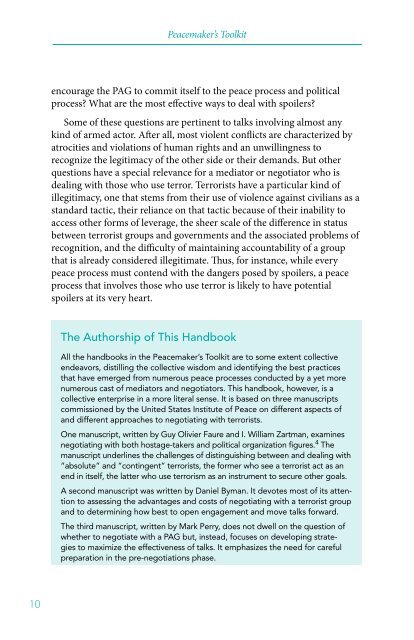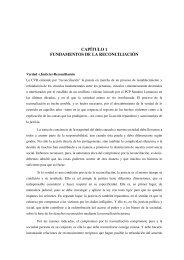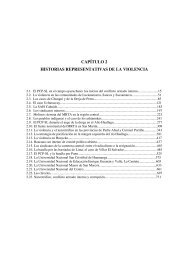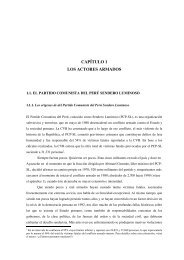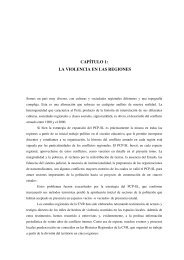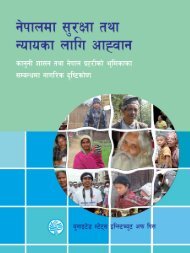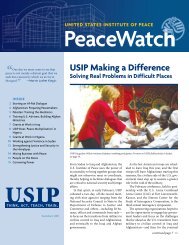Talking to Groups that Use Terror.pdf - United States Institute of Peace
Talking to Groups that Use Terror.pdf - United States Institute of Peace
Talking to Groups that Use Terror.pdf - United States Institute of Peace
Create successful ePaper yourself
Turn your PDF publications into a flip-book with our unique Google optimized e-Paper software.
<strong>Peace</strong>maker’s Toolkitencourage the PAG <strong>to</strong> commit itself <strong>to</strong> the peace process and politicalprocess? What are the most effective ways <strong>to</strong> deal with spoilers?Some <strong>of</strong> these questions are pertinent <strong>to</strong> talks involving almost anykind <strong>of</strong> armed ac<strong>to</strong>r. After all, most violent conflicts are characterized byatrocities and violations <strong>of</strong> human rights and an unwillingness <strong>to</strong>recognize the legitimacy <strong>of</strong> the other side or their demands. But otherquestions have a special relevance for a media<strong>to</strong>r or negotia<strong>to</strong>r who isdealing with those who use terror. <strong>Terror</strong>ists have a particular kind <strong>of</strong>illegitimacy, one <strong>that</strong> stems from their use <strong>of</strong> violence against civilians as astandard tactic, their reliance on <strong>that</strong> tactic because <strong>of</strong> their inability <strong>to</strong>access other forms <strong>of</strong> leverage, the sheer scale <strong>of</strong> the difference in statusbetween terrorist groups and governments and the associated problems <strong>of</strong>recognition, and the difficulty <strong>of</strong> maintaining accountability <strong>of</strong> a group<strong>that</strong> is already considered illegitimate. Thus, for instance, while everypeace process must contend with the dangers posed by spoilers, a peaceprocess <strong>that</strong> involves those who use terror is likely <strong>to</strong> have potentialspoilers at its very heart.The Authorship <strong>of</strong> This HandbookAll the handbooks in the <strong>Peace</strong>maker’s Toolkit are <strong>to</strong> some extent collectiveendeavors, distilling the collective wisdom and identifying the best practices<strong>that</strong> have emerged from numerous peace processes conducted by a yet morenumerous cast <strong>of</strong> media<strong>to</strong>rs and negotia<strong>to</strong>rs. This handbook, however, is acollective enterprise in a more literal sense. It is based on three manuscriptscommissioned by the <strong>United</strong> <strong>States</strong> <strong>Institute</strong> <strong>of</strong> <strong>Peace</strong> on different aspects <strong>of</strong>and different approaches <strong>to</strong> negotiating with terrorists.One manuscript, written by Guy Olivier Faure and I. William Zartman, examinesnegotiating with both hostage-takers and political organization figures. 4 Themanuscript underlines the challenges <strong>of</strong> distinguishing between and dealing with“absolute” and “contingent” terrorists, the former who see a terrorist act as anend in itself, the latter who use terrorism as an instrument <strong>to</strong> secure other goals.A second manuscript was written by Daniel Byman. It devotes most <strong>of</strong> its attention<strong>to</strong> assessing the advantages and costs <strong>of</strong> negotiating with a terrorist groupand <strong>to</strong> determining how best <strong>to</strong> open engagement and move talks forward.The third manuscript, written by Mark Perry, does not dwell on the question <strong>of</strong>whether <strong>to</strong> negotiate with a PAG but, instead, focuses on developing strategies<strong>to</strong> maximize the effectiveness <strong>of</strong> talks. It emphasizes the need for carefulpreparation in the pre-negotiations phase.10


